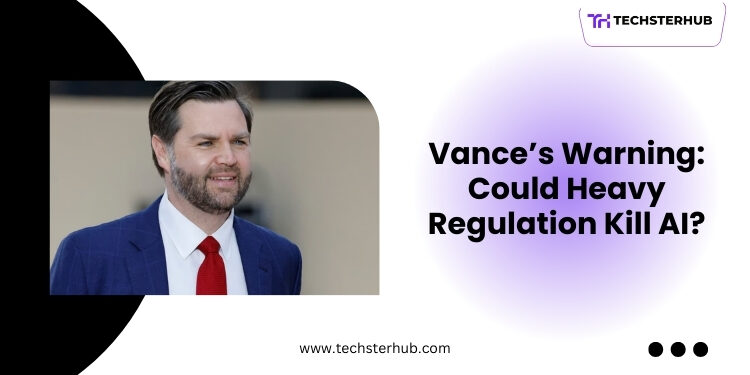Vance a leading AI industry expert stated in a striking announcement that Europe’s heavy AI regulation could suppress innovation and damage technological advancements in artificial intelligence. The timing of Vance’s comments coincides with European lawmakers examining new AI regulations to boost safety and ethical standards. Vance believes that excessive regulation will prevent artificial intelligence from achieving its maximum potential. This article examines Vance’s warning about AI regulation while discussing the ongoing debate in Europe and its implications for the future of AI technology.
The Growing Importance of Artificial Intelligence
Artificial intelligence stands as one of the pivotal and revolutionary technologies that emerged during the 21st century. Countless industries including healthcare and finance as well as entertainment and transportation now use AI technology. Machine learning along with natural language processing and computer vision technologies are enhancing daily operations through smarter and faster solutions.
The ongoing evolution of AI technology expands its capacity to transform industries while enhancing the quality of human life. However, with this power comes responsibility. The ethical implications of AI technology raise issues specifically related to privacy concerns and biased operations as well as the potential for job displacement. The evolution of AI technology has created increasing demand for regulatory measures to safeguard ethical development and application.
Vance’s Warning on AI Regulation
A prominent AI community member Vance voiced his unease about the potential unintended effects of Europe’s AI regulatory measures. He acknowledges the need for regulations to manage AI risks but cautions that excessive regulatory measures may hinder innovation and block AI from achieving its highest capabilities. Vance states that finding the right balance between regulation and innovation remains critical as Europe faces the danger of imposing overly restrictive measures.
Vance’s warning includes several important points that need attention.
Over-Regulation Could Slow Progress
Vance warns that excessively strict AI regulations may obstruct the development of artificial intelligence technologies. The quick advancement of technology could face innovation delays if regulatory bodies establish too many constraints. The process of navigating complex regulations presents time-consuming and costly challenges for AI development companies which may slow their progress.
Europe Could Fall Behind in AI Innovation
Countries such as the United States and China take the lead in AI research and deployment while spearheading technological advancements. Vance warns that Europe risks losing its competitive edge in AI innovation by instituting overly strict regulations. Nations that adopt adaptable regulatory frameworks will draw in skilled professionals and financial resources which will create additional challenges for Europe to maintain its global competitive position.
Uncertainty Around Regulation
The rapid progression of AI technology creates significant difficulties for creating effective regulations. Regulating AI poses challenges since current rules might become obsolete as technology advances. Regulators must maintain adaptability as AI systems progress and new applications develop. The fast-changing landscape of AI development makes it difficult for rigid regulations to remain effective.
Innovation Requires Risk-Taking
Developing AI technology necessitates taking calculated risks and engaging in experimental approaches. Over-regulation would prevent companies and researchers from exploring innovative ideas and technologies according to Vance. At the current developmental stage of AI, ground-breaking advances typically result from daring innovative ideas that have yet to prove their effectiveness. Overly stringent regulations may prevent the necessary risk-taking that drives AI innovation forward.
The Debate on AI Regulation in Europe
European discussions about AI regulation are intensifying while the European Union leads efforts to define future AI policies. The European Commission put forward the Artificial Intelligence Act in April 2021 to establish regulations for safe and ethical AI development. The Act establishes risk categories for AI systems which require different levels of regulation depending on the potential risk each system presents.
The Artificial Intelligence Act generated mixed reactions from both supporters and detractors. Advocates believe this regulation represents an essential measure to promote responsible AI application in sensitive sectors including healthcare, transportation, and law enforcement. The regulatory framework aims to eliminate bias in AI systems while promoting transparency and safeguarding personal rights.
Critics such as Vance express concerns that the AI Act may become excessively restrictive and inhibit innovation. Certain specialists argue that the regulations could inadvertently affect smaller AI businesses and research teams because they cover too many areas. The complicated and ambiguous wording in the Act creates uncertainty which makes it challenging for businesses to understand compliance requirements.
The Risk of Over-Regulation
Over-regulating AI could have several negative consequences:
- Choking Innovation: A supportive environment that promotes experimentation and risk-taking enables innovation to flourish. Overly stringent regulations might prevent AI companies from exploring new technological possibilities which could lead to slower advancement and missed opportunities for breakthrough innovations.
- Pushing AI Development to Other Regions: A restrictive AI regulatory environment in Europe might prompt companies and researchers to move to nations with more favourable regulations. Europe’s competitive position in AI might decline while other regions advance in research and economic growth because of this development.
- Burden on Small Companies: Small businesses and start-up enterprises face difficulties when managing the intricate regulatory demands. Smaller enterprises in the AI industry are at risk of being left behind because they lack the resources to handle regulatory demands which leaves their ability to compete and maintain diversity in the market weakened.
- Global Standards Are Needed: Vance argues that AI requires a global regulatory framework because it operates across international boundaries. The establishment of independent regulations by each region or country would result in a fragmented regulatory environment which makes international cooperation and trade in AI technologies more difficult.
Balancing Regulation and Innovation
Vance is not against regulation altogether. He believes that responsible and ethical AI usage demands appropriate safety measures. Success depends on establishing the proper equilibrium between regulatory frameworks and technological progress. AI regulations need to maintain sufficient flexibility to foster innovation and development while making certain that AI technologies benefit society as a whole.
The following methods help achieve a balance between regulation and innovation.
- Risk-Based Approach: Each AI system should be regulated according to the specific risk levels it presents. AI systems used in high-risk sectors like healthcare and criminal justice need stricter regulations compared to those used in lower-risk areas which can have more relaxed regulatory requirements.
- Collaboration with Industry Experts: Regulators need to partner with AI researchers and developers along with industry leaders to establish practical and effective regulations. Working together with industry specialists allows regulators to develop rules that are both practical and informed by real-world knowledge while meeting AI community requirements.
- Global Cooperation: Countries need to work together to develop global standards for AI regulation in order to prevent fragmentation. The establishment of global standards will lead to uniformity and enable AI development to occur without friction between international borders.
Conclusion
Vance’s alert about heavy regulation threatening AI survival demonstrates a need for balanced regulation. Regulation plays a critical role in protecting users but excessive rules could negatively impact AI innovation and push development activities to international locations. The proposed AI regulations in Europe have triggered a significant discussion because stakeholders must now discover a balanced approach that simultaneously guarantees safety and encourages innovation.
The evolution of AI toward becoming a fundamental component of society requires us to find an equilibrium between stimulating creative advancements and maintaining ethical guidelines. Thoughtful and precise regulation will determine AI’s future by enabling advancement while avoiding any obstruction. The warning from Vance reminds us that AI regulations must anticipate future developments and simultaneously stimulate growth and public safety.











